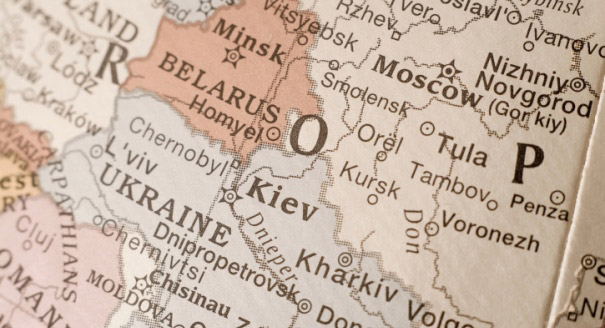Every week a selection of leading experts answer a new question from Judy Dempsey on the foreign and security policy challenges shaping Europe’s role in the world.
Balázs JarábikAssociate fellow at FRIDE and political analyst at the Central European Policy Institute
With its annexation of Crimea, Russia has thrown down the gauntlet. If Moscow moves forward unchecked, its Eurasian customs union may morph into a “Black Sea coastal union” extending from Moldova’s breakaway region of Transnistria in the west to the Caucasus in the east.
Meanwhile, Russia is facing recession while enjoying unprecedented levels of national pride and unity. By contrast, the EU is suffering from a declining European identity amid continued austerity. That may suggest a further escalation of the Ukraine crisis is likely.
The EU can do at least three things. First, it can send observers to all sensitive areas—Southern and Eastern Ukraine and Moldova. Second, it can implement the myriad elements of its Eastern Partnership and encourage additional police and security-sector reforms. Third, it can deliver on its promises, as lofty rhetoric on sanctions or membership perspectives may alienate countries in the EU’s Eastern neighborhood.
There are also several positive developments in Ukraine that the West can build on. The nature of government–citizen relations is changing, while radical parties are showing low ratings in opinion polls. Linguistic tolerance has increased, levels of volunteerism are high, and there is a popular hunger for information. These are all areas in which the EU should focus its assistance efforts.
Michael LeighSenior adviser at the German Marshall Fund of the United States
Russia’s annexation of Crimea is the final confirmation that the EU’s decade-long attempt to surround itself by “a ring of well-governed states” that share the EU’s values has failed. A thorough revamp of the European Neighborhood Policy (ENP) will be the top priority for the EU’s next foreign policy chief and “wider Europe” commissioner, to be nominated after European Parliament elections in May. Genuine diversification of energy supply away from Russia, however painful, should be at the core of the new ENP. If this means a couple of tough winters, so be it.
Members of the European Parliament should make full use of hearings this fall to insist that nominees for high office spell out their thinking on the EU’s policy toward its Eastern neighbors and on transatlantic cooperation. No nominee should be approved who fails to give evidence of clear strategic thinking on the EU’s greatest foreign and security policy challenge.
The new EU leaders and the incoming NATO secretary general must cooperate to reinforce European security, stability, and prosperity. This is the core mission of both organizations. Euroskepticism must not prevent Britain’s foreign secretary from joining his German, French, and Polish counterparts to reinforce the message.
Gianni RiottaMember of the Council on Foreign Relations
Defense. The UK has fewer soldiers today than in 1815, when Lord Wellington checked Napoleon at Waterloo. U.S. armed forces in Europe are not the formidable opponent they used to be during the Cold War. Today, there are about 67,000 U.S. troops in Europe, down from 400,000 at the height of the Cold War; there are 7,000 U.S. sailors, down from 40,000; and there are some 170 airplanes, down from 800 in the early 1990s.
NATO countries have agreed to spend at least 2 percent of GDP on defense. Yet while the United States forks out 4.1 percent, the average defense spending of the alliance’s European members is a puny 1.6 percent. During his recent trip to Europe, U.S. President Barack Obama gave a blunt message: help us with NATO, as we cannot do it by ourselves. But France and the UK continue to slash defense spending, while the rest of the continent has lagged behind for decades. After World War II, Winston Churchill proposed a European army to slash costs and improve efficiency and readiness. His suggestion remains a valid one.
Russia has lost the punch the Red Army used to have. Russian President Vladimir Putin has focused instead on “special wars” like those in Georgia, Chechnya, and Crimea, based on a mix of irregular militias, agents provocateurs, diplomatic blackmail, and propaganda. So far, his efforts have worked beautifully for the Kremlin. Now, Sweden and Poland are rearming, the Baltic countries are worried, but the EU lacks a common plan and vision. It may pay a bitter price for this sin of omission.
Eugeniusz SmolarSenior fellow at the Polish Institute of International Affairs
Frankly, no. How could there be any new ideas, given the realities in the EU and in its Eastern neighbors?
The EU’s Eastern neighborhood emerged as an important region because of Russia’s claim to have a “privileged” relationship with the post-Soviet republics. In practice, that meant using strong-arm tactics to prevent those states from “going West.” Moscow’s annexation of Crimea was a reality check for anyone dreaming of a different world.
So what next?
The EU has had strategic thinking foisted upon it by Vladimir Putin. That is a good thing. NATO has found itself at the center of European events again. The alliance is the only setup that can provide an immediate response to Russia’s claims: a security umbrella for all things political and economic.
If Russia is to modernize, first economically and then socially and politically, it must be forced to do so by understanding the limits of its power. The EU’s best reply to Putin is effective assistance to Ukraine, Moldova, and Georgia in the areas of security and economy.
That is why a meeting of the French, German, and Polish foreign ministers on March 31 and April 1 put much emphasis on making the security situation in Europe’s East a permanent dimension of the EU’s Eastern policy. Defending countries’ sovereignty became a top priority. If combined with structural and institutional reforms, that could lead Eastern European countries onto a path of no return.






.jpg)